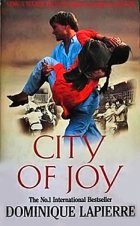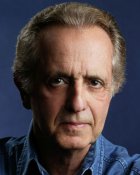
City of Joy Page #2
- PG-13
- Year:
- 1992
- 132 min
- 796 Views
VEEJAY:
I say, are you looking for a wayout of here? We have an extra
seat. Where are you wanting togo?
Max's eyes flick from Veejay to the back view of Manubaias she continues on and back to Veejay.
MAX:
I'm wanting to go wherever you'rewanting to take me.
6.
INT. 180 FOUR-SEATER - DAY
Max is crammed into the back seat with the plump Ravi.
ANOTHER ANGLE:
We see now that, contrary to our assumption that Veejaywould be in the left seat, it's Manubai who's flying theplane. The NOISE of the ENGINE forces them to speaksomewhat loudly.
VEEJAY:
We were among the fortunate backin '48. We got out of East Bengalbefore partition destroyed so many.
We make mattresses. The RajahDouble Spring.
Veejay has an old flask out.
VEEJAY:
We don't have a flight attendanton this flight...
(passing the flask)
Are you a musician, Mr. Loeb?
MAX:
Unattached trumpet player andrecently-certified associate guru.
As he takes a hit on the flask, Max's eye focuses on thelittle mirror on the dash. In it he can see Manubai's
eyes. If we were to judge by what he sees in them, shedoesn't find him the least bit amusing. He smiles his
smile at her.
EXT. HOWRAH STATION (CALCUTTA) - DAY (EARLY MORNING)
A huge bridge dominates the skyline. The train trundles
to a stop, its WHISTLE clearing the way. People hang onits sides, sit on the roof... and now flood the platform,
flowing into the station, clearing a view for us of thePals, clinging to their baggage in the middle of thishuman anthill.
CLOSE ON THEM (MOVING)
Hands reach out with sweets to sell, with tea, asking for
money.
MANOOJ:
Daddy, I'm scared.
(CONTINUED)
7.
CONTINUED:
HASARI:
Scared? No -- why? This is veryexciting. As soon as we get toour friend's house, everythingwill be fine.
But, despite Hasari's charade of confidence, they (andwe) are overwhelmed by the size of the station and thedesperate energy of the humanity around them. As theypress on, a small beggar woman huddled on the platformturns her eyes eerily on Manooj... as a deformed handstretches INTO the FRAME. Aloka senses someone: A
beggar, face half-hidden and eaten away by leprosy. This
terrifying image presses the boys tightly to theirmother and moves Hasari to encircle Armita with one hand
and attempt to wrap the other three inside the embrace ofhis other hand. It does not seem possible that he canprotect all of them against the predatory eyes watchingthem. He moves them quickly to a wall...
HASARI:
Wait right here. Don't move.
WITH HASARI:
He moves to a line of VENDORS, shows a piece of paper toone, as he digs out his precious screw of money to make apurchase of sweets from the Vendor.
HASARI:
Please, can you direct me to myfriend at this address? We are
to stay with him.
The Vendor gives the address a look, shows it to theVendor next to him. Both look at Hasari.
VENDOR #1
There's no such address as this in
Calcutta.
HASARI:
But that's not possible.
VENDOR #1
Of course it is possible! I have
lived here all my life. You are
new. Who would know if a placeexists or does not?
VENDOR #2
Bombay, perhaps. Delhi. Look
there.
(CONTINUED)
8.
CONTINUED:
Dear God, what now? Stunned, Hasari hands Vendor #1 a
rupee and, with the sweets, turns back to his family, hisface going through a magical transformation as heprepares to suggest to the family that all is well.
EXT. CHOWRINGHEE LANE - DAY (MIDDAY SUN)
A few clean and cared-for Ambassador cars sweep into thegateway of the Grand Hotel, past a gateman.
RACK FOCUS TO:
FEET - MAIDAN
Feet tramping the pulsating tarmac, sending up dust.
ANOTHER ANGLE:
The Pals, scared, dispirited, weary, consumed by thecrowd. They've been walking a long time. Shambu cries;
Aloka tries to ease his fear. They stop numbly at theedge of the park, put their bundles down against a longwall.
Across the way, a thin policeman shares a cigarette witha group of traders. There is a deeply fearful look inHasari's eyes, a look he is having difficulty controlling
now. He needs to revive the family's confidence. He
takes out his precious bundle of rupees and gives one toManooj. Manooj, though, is fixed on the cinema acrossthe street. Hasari indicates a stall just across themain road.
HASARI:
Manooj, go and get some fruit.
Come straight back.
Delighted with his task, Manooj sets off, his eyes on themarquee of the theater with its huge cardboard cutout ofKumar Kapur, starring in Hot Gun. Hasari calls out to
him to watch where he's going; the mere crossing of thestreet is a potential parental nightmare. A hand ruffles
Manooj's head and a TALL MAN with dark eyes and a sweetsmile comes at the boy's anxious parents.
GANGOOLY (TALL MAN)
Yes, hello, brother. Bihar, am I
correct?
HASARI:
Yes, how did you know?
(CONTINUED)
9.
CONTINUED:
Hasari is torn between speaking to the man and watchinghis son's incredible journey across the street.
GANGOOLY:
Let me say only that the terriblemalevolence that has visited yourpart of the country affects us all.
HASARI:
Three years without rain. Nothingcame out of the earth but debts.
GANGOOLY:
Terrible. And now, the family onthe street. It is not acceptable.
(smile widens)
And if I can't help, my name is notMr. Gangooly... Which, blessedly,
it is.
And now a smile as full as the sky above.
EXT. SMALL BUILDING IN BACK STREET - DAY
A brick slides out of the wall.
We're BEHIND the brick and see Gangooly's soft face as hereaches in and pulls out a key.
The street is small and empty. Though the houses arenothing much, to the Pals, they look like palaces.
Manooj and Shambu run about in delight. Gangooly motionsfor quiet. With a flourish, he opens the door.
Gangooly enters, glances around, waves the Pals in.
They're amazed. There's a cage occupied by two parrots.
In one corner, a small altar dedicated to the goddessLakshmi is decorated with some flowers and, behind a
torn, plastic curtain in a corner, part kitchen, partwash place, containing a tap with running water.
GANGOOLY:
Be free -- look around.
On the faces of the family is one thought: Is it
possible? Amrita goes right to the parrots.
GANGOOLY:
They'll need feeding. Give them
seed. But don't spoil them.
(CONTINUED)
10.
CONTINUED:
He bows briefly before the altar as he moves to thewashing area.
GANGOOLY:
And now, one of the miracles of
life in the city. One and two...
He turns on the tap and a stream of brown WATER GURGLES
out. The Pals are hypnotized, the fists around theirhearts begin to ease.
GANGOOLY:
Holy water from the Ganges! Flows
out forever. Come -- touch it.
Manooj and Shambu put their hands under the tap.
GANGOOLY:
Drink! It's as pure as the dew onShiva's lips.
They drink. Gangooly claps in delight... and beckonsHasari aside.
FAVORING GANGOOLY AND HASARI
GANGOOLY:
Now, this place is yours for twoweeks. My cousin, Moti, is away,
traveling. Normally, the renttakes fifty rupees for a week, butfor a brother, forty. No, don't
thank me.
Translation
Translate and read this script in other languages:
Select another language:
- - Select -
- 简体中文 (Chinese - Simplified)
- 繁體中文 (Chinese - Traditional)
- Español (Spanish)
- Esperanto (Esperanto)
- 日本語 (Japanese)
- Português (Portuguese)
- Deutsch (German)
- العربية (Arabic)
- Français (French)
- Русский (Russian)
- ಕನ್ನಡ (Kannada)
- 한국어 (Korean)
- עברית (Hebrew)
- Gaeilge (Irish)
- Українська (Ukrainian)
- اردو (Urdu)
- Magyar (Hungarian)
- मानक हिन्दी (Hindi)
- Indonesia (Indonesian)
- Italiano (Italian)
- தமிழ் (Tamil)
- Türkçe (Turkish)
- తెలుగు (Telugu)
- ภาษาไทย (Thai)
- Tiếng Việt (Vietnamese)
- Čeština (Czech)
- Polski (Polish)
- Bahasa Indonesia (Indonesian)
- Românește (Romanian)
- Nederlands (Dutch)
- Ελληνικά (Greek)
- Latinum (Latin)
- Svenska (Swedish)
- Dansk (Danish)
- Suomi (Finnish)
- فارسی (Persian)
- ייִדיש (Yiddish)
- հայերեն (Armenian)
- Norsk (Norwegian)
- English (English)
Citation
Use the citation below to add this screenplay to your bibliography:
Style:MLAChicagoAPA
"City of Joy" Scripts.com. STANDS4 LLC, 2025. Web. 3 Mar. 2025. <https://www.scripts.com/script/city_of_joy_358>.







Discuss this script with the community:
Report Comment
We're doing our best to make sure our content is useful, accurate and safe.
If by any chance you spot an inappropriate comment while navigating through our website please use this form to let us know, and we'll take care of it shortly.
Attachment
You need to be logged in to favorite.
Log In